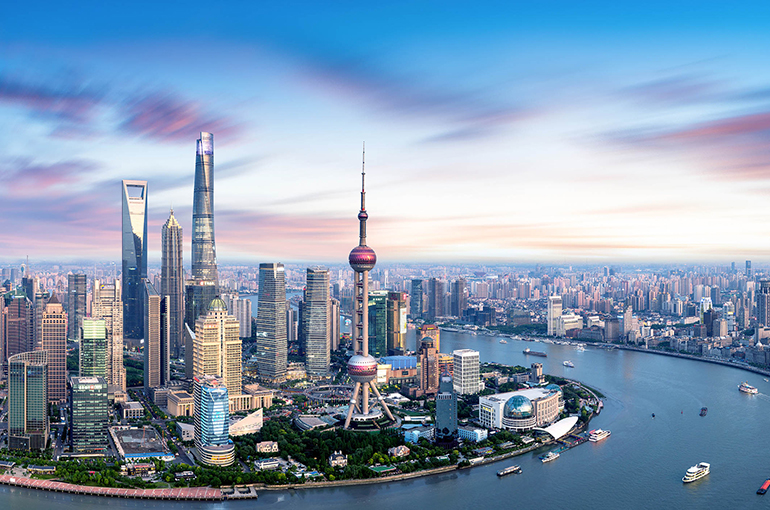 Shanghai Sets Global Standard in 22 Business Metrics, World Bank Report Shows
Shanghai Sets Global Standard in 22 Business Metrics, World Bank Report Shows(Yicai) May 7 -- Shanghai has achieved global leader ranking in 22 of the 59 business indicators identified by the World Bank in its latest survey of 2,189 Chinese firms.
The city scored top global rankings in areas such as power supply reliability, internet stability, availability of alternative arbitration mechanisms, tax filing duration, loan processing speed, and the ease of government procurement and bidding, according to the business survey conducted as part of the World Bank’s Business Ready report.
The results reflect Shanghai’s major achievements in aligning with international standards, optimizing institutional rules, improving government services, and enhancing corporate efficiency, said Luo Peixin, vice president of East China University of Political Science and Law and director of the China Business Environment Research Institute.
Shanghai has steadily upgraded its business environment through eight successive action plans since 2018, progressing from version 1.0 to 8.0 and focusing particularly on the perception of enterprises, which explains the findings of the B-Ready report, according to Chen Lin, integrated business consulting partner at PricewaterhouseCoopers China, which polled the Chinese firms.
An example of speedy financial support in Shanghai is Macklin Biochemical Technology. During a critical growth phase, the reagents supplier quickly obtained a CNY10 million (USD104 million) unsecured loan last year from the Oriental Beauty Valley Industrial Park, where the startup is based, through a financing initiative, greatly lowering both the financial burden and time typically involved in securing funding.
Macklin went on to have a net profit of over CNY100 million (USD13.8 million) in 2024 and saw revenue jump 20 percent in the first quarter of this year. It is now mulling an initial public offering.
More than 80 companies in the industrial park, which is located in Shanghai’s Fengxian district, have secured loans through the same financing initiative, with the average amount ranging from CNY8 million to CNY9 million (USD1.1 million to USD1.2 million), Weng Jun, deputy general manager of the development zone’s operator Hangzhou Bay Economic and Technological Development, told Yicai.
In the international trade field, the Port of Shanghai reported a container throughput in excess of 50 million twenty-foot equivalent units last year, maintaining its position as the world’s busiest port for the 15th consecutive year and setting a new global record.
Since the full launch of international freight consolidation services in 2022, the port has reduced its international freight consolidation time as a transfer hub to just three to five days from the usual 10 to 14 days, outperforming traditional transshipment centers such as Singapore and South Korea’s Busan by two to four days, said Song Xuqiong, GM of a subsidiary of Shanghai International Port Group.
The Shanghai Development and Reform Commission, the city’s economic and social development planner, said the metropolis will further enhance its business environment and better support high-quality economic development through benchmark reforms aligned with World Bank standards, optimize administrative inspections of firms, and innovate financial services for small- and medium-sized enterprises.
B-Ready Reports
The World Bank’s B-Ready reports assess business environments based on three pillars, namely regulatory framework, public services, and corporate efficiency, 10 primary indicators, such as market access, financial services, international trade, and market competition, and three cross-disciplinary themes -- digital applications, environmental sustainability, and gender.
Parallel enterprise survey projects, which have been carried out in 103 global economies, focus on the corporate efficiency pillar and are based on eight of the 10 primary indicators, for a total of 59 metrics.
This latest survey polled 2,189 businesses from six regions in the Chinese mainland. Thirty-nine percent of them were small enterprises, with five to 19 employees, while mid-sized and large enterprises, with 20 to 99 and more than 100 staff, respectively, each accounted for 30 percent. Some 1,187 were manufacturers, 211 were retailers, and 791 were in other service sectors.
This was the first time that the World Bank incorporated business perception into its B-Ready report, which accounted for about 27 percent of the overall enterprise survey project.
Chinese companies overall outperformed the average among the 103 economies in six of the eight primary indicators, including taxation, financial services, and international trade. In all 59 metrics, Chinese firms reached the highest level in 12 of them, such as electronic payments, electricity access, and skills training.
Editor: Futura Costaglione